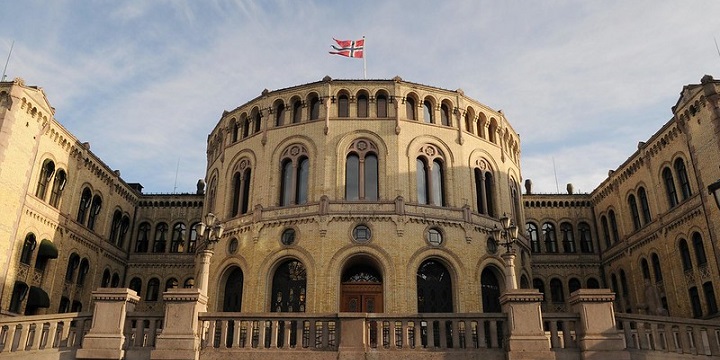 Norway Threatens Palestinian Aid Cut Over Racism, Violence in Textbooks
Norway Threatens Palestinian Aid Cut Over Racism, Violence in Textbooks
Algemeiner Staff
 The Storting in Oslo, Norway. Photo: Stortinget / CC BY-ND 2.0.
The Storting in Oslo, Norway. Photo: Stortinget / CC BY-ND 2.0.
The Norwegian parliament called on the Palestinian Authority on Thursday to remove violent, racist and antisemitic materials from its school curriculum, or else face a drop or cessation in funding.
A majority in the Storting’s 16-member Standing Committee on Foreign Affairs and Defense agreed that financial support to the Palestinian Authority should be cut or reduced “if they do not provide satisfactory improvements to the school materials,” the Aftenposten, Norway’s largest circulation newspaper, reported.
“We can no longer sit still and watch Norwegian money contribute to a teaching system that encourages children to violence and promotes racism and antisemitism,” Hans Andreas Limi, parliamentary leader of the libertarian Progress Party, was quoted as saying.
The move follows a November report in Aftenposten that featured examples of incitement to violence and racial hate in Palestinian school materials, based on findings by the Jerusalem-based Institute for Monitoring Peace and Cultural Tolerance in School Education (IMPACT-se).
The article, as well as IMPACT-se briefings to legislators and other officials, “unleashed a major public debate in Norway about the country’s funding of the extremist Palestinian Ministry of Education textbooks,” the research group said on Thursday.
Minister of Foreign Affairs Ine Eriksen Søreide weighed in, indicating that successive Norwegian governments broached the topic of the school curriculum with the Palestinian Authority, and that some changes to the syllabus have taken place — a claim contested by IMPACT-se.
“On one hand, they tell foreign governments that are horrified by what they have seen that changes are possible,” IMPACT-se CEO Marcus Sheff told The Algemeiner on Thursday. “On the other hand, in Arabic, they tell their own people, ‘Over our dead bodies. It’s not going to happen.‘ The question is which narrative is going to emerge victorious.”
“Nobody wants to be taken for a chump,” added Sheff. “Nobody wants their hard-earned tax money — which is supposed to be used for development and helping children — to instead radicalize children to commit violence and sacrifice themselves.”
The Palestinian Authority has faced continued criticism over its educational curriculum, with a 2018 report by IMPACT-se noting that grade 1-12 textbooks routinely describe Israel as the “Zionist Occupation,” refer to United Nations-recognized Israeli territory as Palestinian, and in some cases praise acts of Palestinian violence against civilians. A September review by the watchdog group of new educational materials used in the 2019–20 academic year found “a systematic insertion of violence, martyrdom and jihad across all grades and subjects.”
In an unprecedented move in August, the UN Committee on the Elimination of Racial Discrimination criticized the Palestinian Authority over “the existence of hate speech in … school curricula and textbooks, which fuels hatred and may incite violence, particularly hate speech against Israelis, which at times also fuels antisemitism.”
Norway committed this year to granting the Palestinian Ministry of Education and Higher Education 220 million krone (some $24 million) by 2022, with annual installments of 55 million krone ($6 million).
IMPACT-se indicated that Thursday’s announcement may affect future disbursement of funds.
In her comments last month, Søreide said Norwegian support did not go to the development of school curriculum or textbook printing, but rather school construction and furnishing, student transportation and teacher training.
She pointed to the ongoing review of Palestinian textbooks being carried out by the Germany-based Georg Eckert Institute, with support from the European Union. “Norway has been actively involved in the preparation of the study and is participating in further follow-up,” she said.
